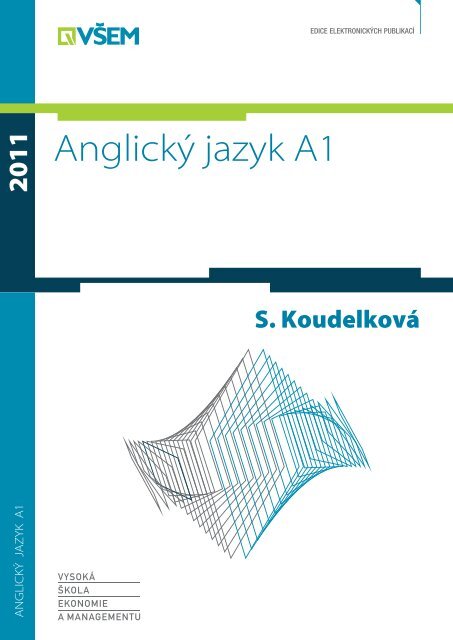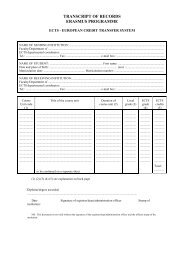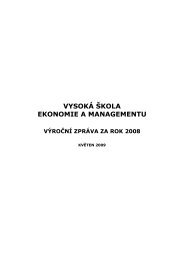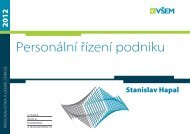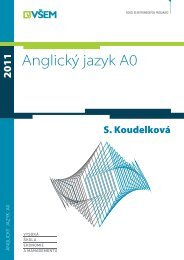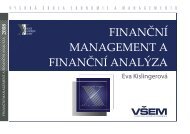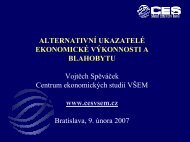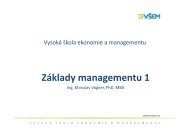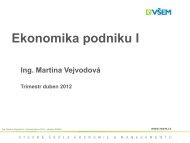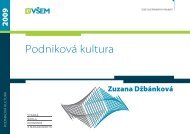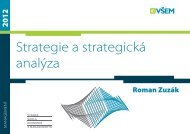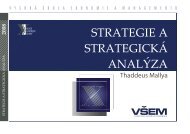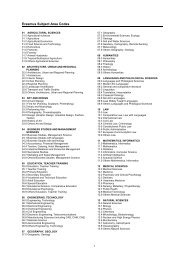Anglický jazyk A1 - VŠEM
Anglický jazyk A1 - VŠEM
Anglický jazyk A1 - VŠEM
Create successful ePaper yourself
Turn your PDF publications into a flip-book with our unique Google optimized e-Paper software.
Studijní opora VŠEM (edice elektronických publikací – kestažení pro kombinované studenty) - strukturaKurz <strong>A1</strong>Cíl kurzu: Cílem kurzu je poskytnout studentům dostatečný vědoostní základ v oblastigramatiky anglického <strong>jazyk</strong>a, který je nezbytný pro rovíjení komunikačních dovedností vangličtině.Základní literatura:HAUER, T., MAŠEK, J.: General English, Book <strong>A1</strong>, Third Edition, VŠEM, Praha 2009, ISBN978-80-86730-49-3.Studijní opora VŠEM.Studijní literatura:MURPHY, R.: English Grammar in Use with Answers and CD-ROM, Cambridge UniversityPress, ISBN 978-O-521-53762-9.REDMAN, S.: English Vocabulary in Use, Pre-intermediate and intermediate, Book andCD-ROM Pack, Cambridge University Press, ISBN 978-O-521-61465-8.Rozšiřující literatura:MC CARTHY, M., O’DELL, F.: English Vocabulary in Use Upper-Intermediate with CD-ROM,Cambridge University Press, 2009, ISBN 978-O-521-67743-1.Doplňující literatura:Překladové a výkladové slovníky všeobecné slovní zásoby.Internetové odkazy:http://www.vsem.cz/e-learning-anglicky-<strong>jazyk</strong>.htmlhttp://www.bbc.co.uk/worldservice/learningenglish/http://www.perfectyourenglish.com/index.htmhttp://www.englishteststore.net/index.php?option=com_content&view=frontpage&Itemid=63Struktura kurzu:Probírané gramatické okruhy:1) Present simple x present continuous2) Past simple x past continuous3) Present perfect simple x present perfect continuous4) Past perfect simple x past perfect continuous5) Expressing future: will x going to x present continuous6) Subject x object question7) Reported speech, conditional mode, conditional sentences8) Modal verbs, passive voice, articles, a few vs. a little, many vs. much, a lot of9) Possessive pronouns, relative pronouns, bare infinitive1
10) Adjectives, adverbs, irregular plural formationPřílohy:Č. 1 Exceptions when adding -sČ. 2 Exceptions when adding -ingČ. 3 Exceptions when adding -edČ. 4 State verbsČ. 5 Review of all the tenses – example sentences, use, signal wordsČ. 6 Key2
Chapter 1Present simple vs. present continuousGoals and OutcomesIn this chapter you will learn to use different present tenses.IntroductionRead the following text and underline all the verbs in present tense (simple orcontinuous). Try to summarize what you already know about these tenses –their forms (positive and negative sentences, questions etc.) and usage.Mary and Joe are in a clothes shop at the moment. They are looking at some jeans. Joeonly has one very old pair of jeans. So he wants to buy a new pair of jeans now. Rightnow, he is trying on a pair of blue jeans. “These jeans fit very well”, he says. “But theydo not suit you”, Mary replies. “Try on another pair”. “What do you think?”, he asksMary, when has tried on another pair. “Great! How much do they cost?”Structure summarya) FormPresent simpleVerb to be:subjectVerb form+ - ?I am (‘m) am not Am Iyou/we/they are (‘re) are not (aren’t) Are you/we/theyhe/she/it is (‘s) is not (isn’t) Is he/she/itOther verbs:subjectVerb form+ - ?I/ you/we/they work Do not (don’t) work Do you workhe/she/it Works Does not (doesn’t)workDoes he work+ See appendix no. 1: Exceptions when adding –ing.Present continuous3
form of 'be' + -ing (present participle)subjectVerb form+ - ?I Am (‘m) working Am not working Am I workingYou/we/they Are (‘re) working Are not (aren’t) Are you workingworkingHe/she/it Is (‘s) working Is not (isn’t)workingIs he working+ See appendix no. 2: Exceptions when adding –s.b) UsePERMANENT ACTION=PRESENT SIMPLEColin plays football every Tuesday. (= ingeneral, always)Bob works in a restaurant. (= it is his job)TEMPORARY ACTION=PRESENT CONTINUOUSLook! Colin is playing football now. (=right now, temporarily)Jenny is working in a restaurant this week.(= only for a limited period of time)Signal WordsPRESENT SIMPLEalways, every ..., often, normally, usually,sometimes, seldom, never, first, thenPRESENT CONTINUOUSat the moment, at this moment, today,now, right now, Listen!, Look!+ See appendix no.4: State verbsExercisesActions happening regularly vs. at this moment, right now1.1 Complete the sentences with the verbs in brackets (present simple orpresent continuous).1. James (live) __________________in a little village.2. He (be) ___________________in his last year at school.3. After school, James (want) ______________to become a banker.4. So this week, he (do) _____________a practical course in a bank.5. There (be) _________________a bank in a nearby town, but James (have)____________to take the bus to get there.6. The bus (leave) ____________at 5.30 in the morning and (return)________________at 8.15 in the evening.4
7. James (not / like) _______________to spend so much time in town before andafter work, waiting for the bus.8. Therefore, this week he (stay) ______________with his aunt, who (live)__________________in town.9. James usually (wear) ____________________jeans and t-shirts, but while he(work) _______________for the bank now, he (wear) ________________a suitand a tie.Permanent vs. temporary actions1.2 Complete the sentences with the verbs in brackets (present simple orpresent continuous).1. Sue (be) _______________a student from South Korea.2. She (live) _________________in Seoul and (study) ______________medicine.3. At the moment, however, Sue (live) ________________in London.4. She (do) _____________________a six-month practical course in a Londonhospital.5. In five days, Sue (go) ______________back to South Korea because the nextterm at university (start) ____________________in ten days.5
Chapter 2Past simple vs. past continuousGoals and OutcomesIn this charter you will learn to speak about events that happened or were happening inthe past.IntroductionRead the following text and underline all the verbs in past tense (simple orcontinuous). Try to summarize what you already know about these tenses –their forms (positive and negative sentences and questions, any exceptionsetc.) and usage.Tom got up hungry, and sauntered hungry away, but with his thoughts busy withthe shadowy splendours of his night's dreams. He wandered here and there inthe city, hardly noticing where he was going, or what was happening around him.Structure summarya) FormPast simpleRegular verbsVerb + -ed (past participle)Irregular verbs• see the 2 nd column of irregular verbs tables = the past participle (e.g. I spoke)subjectVerb form+ - ?I/you/he/she/it/we/you/they you came You did not(didn’t) comeDid you come+ See appendix no.3: Exceptions when adding -ed.Past continuousWas/were + –ing (present participle)6
subjectVerb form+ - ?I/he/she/it was working was not working Was he workingYou/we/they were working were not (weren’t)workingwere you working+ See appendix no. 1: Exceptions when adding –ing.b) UsePAST SIMPLEActions in the past that happened oneafter another:PAST CONTINUOUSActions in the past that happened atthe same time:She came home, switched on the computer andchecked her e-mails.Only mentioning:Colin played football yesterday.Simon was playing on the computer while hisbrother was watching TV.Emphasizing progress (an action wastaking place at a certain time):Yesterday at six o'clock, Colin was playingfootball.COMBINATIONIf a new action happened in the middle of another action (PAST SIMPLE = thenew action, PAST CONTINUOUS = the action already in progress):While I was sitting in a meeting, my mobile suddenly rang.+ See appendix no. 4: State verbsSignal WordsFirst, then, ifPAST SIMPLEPAST CONTINUOUSWhen, while, as long asExercises2.1 Put the verbs in brackets into past simple1. The receptionist (welcome) ____________the guests and (ask)_________________them to fill in the form.2. The car (break) ________________down and we (have)___________________to walk home.3. He (wake) ______________up and (look) __________________at his watch.4. My father (come) ___________________in, (look) ________________aroundand (tell) ___________________me to tidy up my room.7
5. Martha (turn) _______________off the lights and (go) ________________tobed.2.2 Put the verbs in brackets into past continuous1. The boys (swim) _______________while the girls (sunbathe)_____________________.2. As long as one group (prepare) ___________________dinner, the others (collect)_________________wood for their campfire.3. While the parents (have) _____________breakfast, their children (run)_______________about.4. While Tom (read) _____________, Amely (watch) ______________adocumentary on TV.5. Nobody (listen) __________________while the teacher (explain)_______________the tenses.2.3 Put the verbs in brackets into the correct tense (past simple or pastcontinuous). Both the verbs in each sentence are either in past simple or inpast continuous.1. Marvin (come) _____________home, (switch) ________________on thecomputer and (check) ____________his emails.2. The thief (sneak) ________________into the house, (steal)_______________the jewels and (leave) ______________without a trace.3. While we (do) ____________a sight-seeing tour, our friends (lie)_____________on the beach.4. He (wake) ______________up and (look) __________________at his watch.5. While we (travel) _______________ around Europe, our son (prepare)______________for the final state exam.2.4 Put the verbs in brackets into the correct tense (past simple or pastcontinuous).1. We (wait) ________________for Jane, when suddenly Louis (come)__________________around the corner.2. I (cycle) ________________through the park, when I (hear)__________________a strange noise.8
3. He (pass) ___________________her a message when the teacher (look / not)___________________.4. I (fall) ______________asleep while I (watch) ____________________TV lastnight.5. When Mike and Jane (paint) _____________________the walls, their dog (knock)________________over the paint pot.6. Tom (break) ___________________his leg when he (play)___________________ice-hockey.7. The phone (ring) ________________when I (sit) _____________________onthe toilet.8. I (jog) ___________________in the park, when two squirrels (cross)_________________my way.9. Robert (fall) __________________off the ladder when he (pick)___________________cherries.10. When we (travel) ________________around Ireland, we (meet)_________________some very nice people.2.5 Complete the dialogue by putting the verbs in brackets into the correcttense (past simple or past continuous).A: »What (do / you) __________________yesterday at 8 pm?«B: »I (sit) _________________in the pub with Sam. Why?«A: »I (drive) __________________to the sports centre at that time to play squash witha few friends. As we only three players, I (try) ____________________to ring you toask if you would like to come as well. But I (reach / not) ___________________you athome.«B: »Why (ring / not / you) ____________________my mobile?«A: »I actually (want) ________________to ring your mobile, but by accident I (dial)________________William's number. He (do / not) __________________anythingspecial at that moment and really (like) ________________the idea of playing squashwith us.«9
Chapter 31) Present perfect simple vs. present perfectcontinuous2) Present perfect simple vs. past simpleGoals and OutcomesIn this charter you will learn to make a distinction between events that are referred to bypresent perfect tenses in English (either simple or continuous). You will also revise thedifferences between the present perfect tense and simple past.1) Present perfect simple vs. present perfectcontinuousIntroductionRead the following text and underline all the verbs in present perfect tense(simple or continuous). Try to summarize what you already know about thesetenses – their forms (positive and negative sentences, questions etc.) andusage.A: I have been calling you for half an hour. Where have you been? And why are yourclothes so dirty?B: I have been tidying up the shed in the garden.A: Have you found a box with old photos there? I have been looking for it for ages.B: I have not discovered it yet, but I have been working on that for a long time yet. Ihave just come in to eat something.A: I have not cooked anything yet because I have been talking to our neighbour.Structure summarya) FormPresent perfect simpleHave/has + -ed (past participle)subjectverb form+ - ?I/you/we/you/they You havecome/workedYou have not(haven’t)come/workedHave youcome/worked10
he/she/itHe hascome/workedHe has not (hasn’t)come/workedHas hecome/worked+ See appendix no. 3: Exceptions when adding –ed.Present perfect continuoussubjectHave/has + been -ing (present participle)I/you/we/you/they You have beenworkinghe/she/itHe has beenworkingverb form+ - ?You have not(haven’t) beenworkingHe has not (hasn’t)been workingHave you beenworkingHas he beenworking+ See appendix no. 1: Exceptions when adding –ing.b) UsePRESENT PERFECT SIMPLEThe action is completed, or weemphasize the RESULT:I have done my homework. (Meaning: Myhomework is completed now.)RESULT (a completed action led to adesired result)I have washed the car. (Result: The car is cleannow.)PERMANENT ACTION/SITUATIONJames has lived in this town for 10 years.(Meaning: He is a permanent resident of thistown.)PRESENT PERFECT CONTINUOUSWe emphasize the DURATION of anaction:I have been doing my homework.(Meaning: That's how I have spent mytime. It does not matter whether thehomework is completed now.)UNWANTED SIDE EFFECT (the actionhad an unwanted side)Why are you so wet? - I have been washing thecar. (side effect: I became wet when I waswashing the car. It does not matter whetherthe car is clean now.)TEMPORARY ACTIONJames has been living here for a year.(Meaning: This situation is only temporary.Maybe he is an exchange student and only herefor one or two years.)+ See appendix no. 4: State verbs.Signal WordsPRESENT PERFECT SIMPLEhow often, ... timesPRESENT PERFECT CONTINUOUShow long, since, forExercises3.1 What is emphasised? Choose the correct option.11
1. I have cooked dinner.a) emphasising that dinner is ready nowb) emphasising how I have spent my time2. She has been reading a book.a) emphasising that she has read the book completelyb) emphasising how she has spent her time3. He has closed all the windows.a) emphasising that all windows are closed nowb) emphasising how he has spent his time4. I have tidied up my room.a) emphasising that the room is tidy nowb) emphasising how I have spent my time5. We have been swimming.a) emphasising, that we are not swimming anymore nowb) emphasising how we have spent our time3.2 Put the verbs in brackets into present perfect simple.1. One can see through the windows again. Jane (clean) ________________them.2. We can watch the film now. Michael (connect) ________________________theDVD player.3. The room looks much nicer now. I (hang) ___________________________upsome pictures.4. Can I go outside? I (already / do) _________________________my homework.5. I am not hungry. I (eat / already) ____________________________something.3.3 Put the verbs in brackets into present perfect continuous.1. I (play / not) _______________________the computer for half an hour, only forabout 5 minutes.2. We (run / not) _______________________for 40 minutes yet - there are still 10minutes left.3. You are absolutely sunburned. You (sit) ________________________________inthe sun too long.4. Freddy is completely wet. He (wash) ____________________________the dog.12
5. My eyes are red because I (cut) ___________________________onions.3.4 Complete the dialogue by putting the verbs in brackets into the correcttense (present perfect simple or present perfect continuous).A: (you / play / ever) _______________________________tennis?B: I (play / only) __________________________tennis once or twice. And you?A: I (learn) _________________________tennis for two years.B: (you / take) ______________________part in any competitions yet?A: I (participate) _______________________in four contests this year.B: (you / win) _______________________any prizes so far?A: No, I (win / not) _____________________anything yet. I'm not that good yet. (you/ enter / ever) ________________________a contest?B: I (swim) ________________________for seven years and I (receive / already)__________________________some trophies.State vs. dynamic verbs3.5 Use the verbs in present perfect continuous, if possible. If it is not possible,use the present perfect simple.1. We (know) _______________________them for 15 years.2. They (watch) ____________________________TV for 3 hours.3. We (work) __________________________for 7 hours without a break.4. How long (you / learn) _________________________English?5. She (prepare) _____________________________dinner for two hours.2) Present perfect simple vs. past simpleIntroductionRead the following text and underline all the verbs in past simple and presentperfect simple. Try to summarize what you already know about the differencebetween these tenses, concerning the situations when they are used.A: Did you go to the cinema last night?B: Yes. I was there with Sue and Louis. Have you been to the cinema recently?A: I last went to the cinema two weeks ago.B: So you have not seen the new action film yet.13
A: No, unfortunately not. Did you enjoy it?B: Oh, I really loved it. But Sue did not like it - too much action!Structure summarya) FormPast simple- See Chapter 2Present perfect simple- See Chapter 3 a)b) Use 1PRESENT PERFECT SIMPLEThe action has just, already, not yethappened. How often an action hashappened till now:I have just phoned Mary.How often an action has happenedTILL NOW (there is a connection withthe present situation):Have you ever been to Canada? / I have beento Canada twice.Emphasis on RESULT (a past action'sconsequence in the present):I have bought a new bike. (With this sentence Iactually want to express that I have a new bikePAST SIMPLEThe action happened at a CERTAINTIME IN THE PASTI phoned Mary 2 minutes ago.A certain event in the past:He went to Canada last summer.Emphasis on ACTION:I bought a new bike. (just telling what I did inthe past.)1 In British English, the use of Simple Past and Present Perfect is quite strict. As soon as a time expression inthe past is given, you have to use Simple Past. If there are no signal words, you must decide if we just talkabout an action in the past or if its consequence in the present is important.Note that the following explanations and exercises refer to British English only. In American English, you cannormally use Simple Past instead of Present Perfect.14
now.)Signal WordsSIMPLE PASTYesterday, ...ago, in 1990, the other day,last...PRESENT PERFECT SIMPLEJust, already, up to now, until now, tillnow, ever, (not) yet, so far, lately, recentlyExercises3.6 Put the verbs in brackets into past simple.1. Tom (move) _______________________ to this town in1994.2. My friend (be) _______________________in Canada two years ago.3. Last week, Mary and Paul (go)_____________________ to the cinema.4. (they/spend) _____________________________their holiday in New Zealandlast summer?5. I (see) ____________________________an interesting film yesterday.3.7 Put the verbs in brackets into present perfect simple.1. I (just / finish) __________________________my homework.2. Mary (already / write) ______________________five letters.3. I (not / be) __________________________to Canada so far.4. But I (already / travel) __________________to London a couple of times.5. (you / ever / see) _________________________a whale?3.8 Put the verbs in brackets into past simple or present perfect simple.1. My friend (be) ________________________to Edinburgh three times.2. Some years ago he (study) ________________________English there.3. Last month he (visit) _________________________some friends in Edinburgh.4. Unfortunately, I (can / not) ___________________________go to Edinburghwith him.5. This is a pity. They are my friends, too, and I (see / not)___________________________them for ages.15
3.9 Put the verbs in brackets into past simple or present perfect simple.1. My friends (visit) _____________________________the Grand Canyon NationalPark last year.2. I (be / never) ______________________________to the Grand Canyon NationalPark.3. But they (show) ___________________________me lots of wonderful pictureswhen they came.4. And yesterday I (buy) ___________________________a book about the GrandCanyon.5. I (read) ____________________________30 pages already. It's reallyinteresting.16
Chapter 41) Past perfect simple vs. past perfect continuous2) Past perfect simple vs. past simpleGoals and OutcomesIn this charter you will learn to make a distinction between events that are referred to bypast perfect tenses in English (either simple or continuous). You will also revise thedifferences between the past perfect tense and simple past.1) Past perfect simple vs. past perfect continuousIntroductionCan you feel a difference between these two sentences?When I last went to Moscow, they had renovated St Basil’s Cathedral.XWhen I last went to Moscow, they had been renovating St Basil’s Cathedral.Structure summarya) FormPast perfect simplesubjectHad + -ed (past participle)I/you/he/she/it/we/you/they You hadcome/workedverb form+ - ?You had not(haven’t)come/workedHad youcome/workedPast perfect continuousHad + been -ing (present participle)subjectI/you/he/she/it/we/you/they You had beenworkingverb form+ - ?You had not(haven’t) beenworkingHad you beenworking17
) UsePAST PERFECT SIMPLEStress on the completion of a situationor activity or its effects:I had worked hard and the report was nowfinished. (emphasises the result)PAST PERFECT CONTINUOUSStress on the continuity or duration ofa situation or activity:I had been working hard, so I felt Ideserved a holiday. (emphasizes theactivity)+ See appendix no.4: State verbs.Exercises4.1 Put the verbs in brackets into past perfect simple1. (they / lock)_____________________ the door before they left?2. (they / know)______________________ about the disaster before they saw it onTV.3. The landscape in this area (look)_______________________ wonderful beforethe floods came.4.2 Put the verbs in brackets into past perfect continuous1. She (study)_______________________Spanish for 2 years when she came toour class.2. George resigned last week. He (work)______________________________ forour company for 12 years.3. Peter gave up playing American football a few years ago. He(play)_________________________ since 1997.4.3 Choose the correct option1. I arrived at the exam late. When I _____ (arrive) they _____ (do) the test for halfan hour.a) I arrived at the exam late. When I arrived they were doing the test for half anhour.b) I arrived at the exam late. When I arrived they had been doing the test forhalf an hour.c) I arrived at the exam late. When I arrived they had done the test for half anhour.2. Jack _____ (wash) his car when it _____ (start) raining.18
a) Jack had been washing his car when it started raining.b) Jack washed his car when it started raining.c) Jack washed his car when it had been starting raining.2) Past perfect simple vs. past simpleIntroductionUnderline all the verbs in past simple and in past perfect simple. Could younow explain why these tenses are used in these situations?There was a horrible storm that night, but apart from that nothing scary happened. Thenext morning, however, when the family came down to breakfast, they found theterrible stain of blood once again on the floor. Washington cleaned it a second time, butthe second morning it appeared again. The third morning it was there, too, although thelibrary had been locked up at night by Mr Otis himself.The second appearance of the ghost was on Sunday night. Shortly after the family hadgone to bed they heard a fearful crash in the hall.Structure summarya) FormPast perfect simple- See chapter 4Past simple- See chapter 2b) UsePAST PERFECT SIMPLEBefore/up to a certain time in thepast:Before her sixth birthday, Jane had neverbeen to the zoo.PAST SIMPLESome time in the past:Jane got up at seven. She opened herbirthday presents and then the wholefamily went to the zoo.Signal WordsFirst, thenPAST SIMPLEPAST PERFECT SIMPLEAlready, up to then, before that day,after19
Exercises4.4 Put the verbs into the correct tense. In each sentence, one of the verbs isalways in past simple and the other one is in past perfect simple.1. My friend (eat) _____________up all the biscuit we(bake)______________________.2. The teacher (correct) ______________________the tests we(write)____________________.3. I (give) __________________them some of the candies I(buy)_____________________.4. My sister (see / not) ___________________the note that I (lay)____________________on the kitchen table for her.5. We (want) ____________________to watch a film that we (see / not)____________________________before.4.5 Four of the following sentences are correct. Three of them contain amistake of verb form.Your task:- Write “OK” if the sentence is correct- Write the correct verb form(s) of the incorrect sentences (past simple orpast perfect simple). One or both the verbs in each sentence may beincorrect.1. When he woke up, his mother had already prepared breakfast._____________________________________________________________________2. We went to London because the Queen had invited us for tea._____________________________________________________________________3. When she had started to learn English, she already studied French._____________________________________________________________________4. Jane had already read ten pages when her computer crashed._____________________________________________________________________20
5. By the time he arrived at the pub, they ran out of beer._____________________________________________________________________6. I had knowed him for a long time before I met his family._____________________________________________________________________7. They did not know where to meet because nobody had told them._____________________________________________________________________4.6 Fill the gaps with the correct tense. Use past simple or past perfect simple.The PilgrimsIn the 17th century, there (be) ____were_____lots of religious tensions in England.King James I (not / allow) ___________________ (1) freedom of religion in England ashe (have) _______________________ (2)problems with certain religious groups in thepast. That's why during his reign some people (leave) ______________________ (3)the country. In September 1620 for example, members of the English Separatist Church(go) ______________________ (4) aboard on the Mayflower to emigrate to America.Before their journey to America, they (live / already) ___________________ (5) inHolland for a while. Now on the Mayflower, storms (make) _________________ (6) thejourney to America difficult. The Pilgrims only (reach) _____________________ (7)America after they (sail) _____________________ (8) the Atlantic for 66 days.Because of the delay, the Pilgrims (not / build) ________________________ (9)enough houses and they (not / collect) _____________________ (10) enough foodwhen winter (begin) _____________________ (11). By spring, half of the 100 Pilgrims(die) ______________________ (12) of hunger and cold. But then, in March 1621, thePilgrims (meet) _______________________ (13) the friendly Wampanoag. Onemember of the Wampanoag, Squanto, even (know) _____________________ (14)English because several years before he (spend) _______________________ (15)some time in Europe. The Wampanoag (show) ______________________ (16) thePilgrims how to hunt and fish. They also (give) ________________________ (17) thePilgrims seeds to grow corn and beans. After the Pilgrims (harvest)________________________ (18) the food in autumn, they (celebrate)________________________ (19) their good harvest with the Wampanoag. This eventis known today as the first Thanksgiving.21
Chapter 5Expressing future: will vs. going to vs. presentcontinuous (vs. present simple)Goals and OutcomesIn this charter you will learn how to refer to events set in the future.IntroductionRead the following dialogue. It is an interview with a person charged with amarketing campaign. Underline all the verbs where the person refers into futureand answer the following question:Is the person talking about spontaneous decisions or about carefully plannedactions?A: What are you going to change in the next campaign?B: We are going to start the campaign earlier. And we are going to focus on a specifictarget group.A: Which target group are you going to reach?B: Housewives aged 30 to 40.A: How are you going to get these prospects to buy our products?B: The campaign is going to make clear that these products can make life a lot easier forthe housewife.Structure summary and useWILL GOING TO PRESENTCONTINUOUSINTENTIONS,PLANS for thefuture:The Government isnot going to lowerthe taxes.SPONTANEOUSdecision in theMOMENT OFSPEAKING:Oh, your bag looksheavy! Wait, I willhelp you.FutureARRANGEMENTS:action alreadyarranged for thenear future,something alreadyplanned (forexample, it isalready in yourdiary):What are you doingPRESENT SIMPLEAn action set by aTIME TABLE orschedule,something thathappensregularly:Hurry up! The busleaves in twominutes!22
Predictions basedon presentevidence:Look at these bigblack clouds! It isgoing to rain.tomorrow?Exercises5.1 Complete the sentences with “will”1. I (give) _________________you my business card.2. Mister Carlisle (get) ____________________back to you in a minute.3. We (fax) _______________________our order.4. I (be) _______________________with you in a second.5. If you fax your order immediately, we (send) ______________________thegoods today.5.2 Fill the correct form of “will” or “going to”:1. A: Where are you going?B: I ______ visit a customer.2. A: Would you like to come to my house for dinner and talk about this?B: Good idea. I ______ bring some wine.4.3 Complete the sentences. Use present simple and present continuous.1. I (be) _____________________very busy today.2. At noon I (visit) ________________________my friend Tanya.3. We (want) ______________________to have lunch together.4. In the afternoon I (play) ________________________squash with Emily.5. In the evening, I (meet) ____________________________Rob.6. The film (start) __________________________at 8 pm.5.4 Put the verbs into the correct form (will, going to, simple present orpresent continuous).23
1. Our train (leave) ______________________at 4:47.2. A: What (wear / you) ____________________at the party tonight?B: I haven't made up my mind yet. But I think I (find)_________________something nice in my mum's wardrobe.3. Hurry up! The conference (begin) ___________________in 20 minutes.4. My horoscope says that I (meet) _________________an old friend this week.5. JOKE: What does a blonde say when she sees a banana skin lying just a fewmetres in front of her? - Oh dear! I (slip) ___________________!24
Chapter 6Subject question vs. object questionGoals and OutcomesIn this charter you will revise the forms of questions in present simple and past simple.You should be able to distinguish between object and subject questions and use thesestructures correctly.IntroductionUsually, students learn that in present simple, you need the auxiliary verb “do” or “does”to form a question and that in past simple we use “did” instead. But is it always true? Areall the questions formed this way?Structure summaryOBJECT QUESTIONWho did you see?“who” = objectIn Czech: KOHO jsi viděl?(4. pád, předmět)An object question asks about the object ofthe sentence.You MUST change the word order of thequestion:Frank saw an accident.›What did Frank see?SUBJECT QUESTIONWho saw you?“who” = subjectIn Czech: KDO tě viděl?(1.pád, podmět)A subject question asks about the subjectof the sentence.Do NOT change the word order of thequestion:An accident happened last week.›What happened last week?The difference between object and subject question applies to questions in presentsimple or past simple.Exercises6.1 Choose the correct questions. You should ask a question about the wordunderlined:1. I bought a newspaper this morning.a. What bought you this morning?b. What did you buy this morning?2. Something odd happened during the storm last night.25
a. What happened during the storm last night?b. What did happen during the storm last night?3. One of the students didn't do the final exam.a. Who didn't the final exam do?b. Who didn't do the final exam?4. I wrote a romantic letter to one of the teachers.a. Who did you write a romantic letter to?b. Who wrote you a romantic letter?5. Something disturbed me when I was working.a. What did you disturb when you were working?b. What disturbed you when you were working?6.2 Make questions with “who” or “what”. In these questions, “who”/”what” isthe subject:Example:Somebody broke the widow. › Who broke the window?1. Something fell off the shelf. › What ______________________________?2. Somebody wants to see you. › Who ______________________________?3. Somebody took my umbrella. › Who ______________________________?4. Something made me ill. › What _________________________________?6.3 Make questions with “who” or “what” (subject or object):Example:I bought something. › What did you buy?Somebody lives in this house. › Who lives in this house?1. I phoned somebody. › ___________________________________?2. Something happened last night. › __________________________?3. Somebody knows the answer. › ____________________________?26
4. Somebody did the washing up. › ___________________________?5. Jill did something. › _____________________________________?6. Something woke me up. › ________________________________?7. I met somebody. › ______________________________________?8. Somebody has got my pen. › ______________________________?6.4 Read the following text. Some pieces of information are missing there.Create questions to ask about the missing components:Example:1. Who bought a new car last week?(1)_____ (who) bought a new car last week. It is a beautiful new Cadillac. He bought thecar because (2) __________ (why). My father has driven a Cadillac for many years.(3)_____ (who) says it's the kind of car that people respect. In fact, (4)_______ (who)have always driven Cadillacs. I remember that (5)________ (who) used to drive aCadillac. When my (6) _____ (who) first met Elvis, he saw that he was driving a(7)________ (what). It was then that my father decided to buy a (8) _______ (what).2. _______________________________________________________________3. _______________________________________________________________4. _______________________________________________________________5. _______________________________________________________________6. _______________________________________________________________7. _______________________________________________________________8. _______________________________________________________________27
Chapter 71) Reported speech2) Conditional mode3) Conditional clausesGoals and OutcomesIn this charter you will learn what happens with the grammar tenses and other words ina sentence if we are paraphrasing what someone else said in the past. Furthermore, youshould be able to express hypotheses in English.1) Reported SpeechIntroductionCompare the two sentences, say how they differ and try to explain why:Ann: “He had an accident yesterday.”XAnn said he had had an accident the day before.Important rulesIf we report what another person has said, we usually do not use the speaker’s exactwords (direct speech), but reported (indirect) speech. Therefore, you need to learn howto transform direct speech into reported speech. The structure is a little differentdepending on whether you want to transform a statement (a), question (b) or request(c).a) StatementsWhen transforming statements, check whether you have to change:• pronouns• present tense verbs (3rd person singular)• place and time expressions• tenses (backshift)DIRECT SPEECH REPORTED SPEECH (NOBACKSHIFT)“I will speak English.” He says that he will speakEnglish.REPORTED SPEECH(BACKSHIFT)He said* that he wouldspeak English.28
BackshiftsIf the tense of the main clause is the past simple, then in reported speech, the tenses(the verb forms) have to “shift backwards” – in the following way – see the table:DIRECT SPEECHPresent simplePresent continuousPast simplePresent perfect simplePast perfect simplePast continuousPresent perfect continuousPast perfect continuousgoing towillConditional I (would)REPORTED SPEECHPast simplePast continuousPast perfect simplePast perfect continuouswas / were going toConditional I (would)In the following table, you will find ways of transforming place and time expressions intoreported speech.DIRECT SPEECHtodaynowyesterday… days agolast weeknext yeartomorrowherethistheseREPORTED SPEECHthat daythenthe day before… days beforethe week beforethe following yearthe next day / the following daytherethatthoseb) QuestionsWhen transforming questions, check whether you have to change:• pronouns• present tense verbs (3rd person singular)• place and time expressions• tenses (backshift)Also note that you have to:• transform the question into an indirect question• use the interrogative or if / whether29
DIRECT SPEECHWhy don’t you speak English?Do you speak English?REPORTED SPEECHHe asked* me why I didn’t speakEnglish.He asked* me whether / if I spokeEnglish.* tense of the introductory clauseExercises7.1 Complete the sentences in reported speech. Note whether the sentence is astatement or a question and whether you have to change the tenses or not.1. She said, "I am reading now."→ She said that ___________________________________________________2. He said, "I know a better restaurant."→ He said that ____________________________________________________3. She said, "I woke up early yesterday."→ She said that ____________________________________________________4. He said, "I will ring her tomorrow."→ He said that _____________________________________________________5. He said, "I will clean the car."→ He said that _____________________________________________________6. She said, "I don't know whether they are here."→ She said that ____________________________________________________7. "Why haven't you phoned me?" he asked me.→ He wondered ____________________________________________________8. "Where did you spend your holidays last year?" she asked me.→ She asked me ___________________________________________________9. "Have you been shopping?" he wanted to know.→ He wanted to know _______________________________________________2) Conditional modeIntroductionRead the following sentences and translate the underlined expressions intoyour mother tongue.You should go and meet your friend at the station!Could you wait for me or not?Would you be so kind and bring it for me, please?30
Structure summary, important rules, formsThe conditional mode is used to talk about an action that might take place. It isexpressed by means of the following verbs: would, could, should.Conditional I. (in present)+ - ?He would be talking. He would not be talking. Would he be talking?They could come They couldn’t come Could they come?The train should be leavingnow.Conditional II. (in past)The train shouldn’t beleaving now,Shouldn’t the train beleaving now?+ - ?He would have talked. He would not have talked. Would he have talked?Exercises7.2 Put the verbs into the correct form (conditional I simple) using the verb“would”, “could” or “should”, according to the meaning of the sentence:1. They (walk) ______________________to the station.2. He (tell) _________________________you the truth.3. I (go) ___________________home.4. They (watch) ________________________a scary movie if they were allowed to.5. You (not / say) _________________________that.7.3 Put the verbs into the correct form (conditional II continuous), use theverb “would”:1. He (work) ________________when the accident happened. But that day he wenthome earlier.2. If the storm had not frightened them, the kids (sleep) __________________allnight.3. If I had not sent them outside, they (sit) _______________________in front ofthe computer all day.4. If he had won the race, he (celebrate) ______________________three days in arow.5. If he had not had to go home, we (play) __________________________chess allnight.31
3) Conditional sentencesIntroductionLook at the following three sentences and label the underlined verb forms (sayhow these tenses are called):If I find her address, I will send her an invitation.If I found her address, I would send her an invitation.If I had found her address, I would have sent her an invitation.Structure summaryConditional sentences are used to express that the action in the main clause (withoutif) can only take place if a certain condition (in the clause with if = subordinateclause) is fulfilled. There are three types of conditional sentences.Conditional Sentence Type 1MAIN CLAUSESUBORDINATE CLAUSE (starting with“if…”)We will catch the bus……if we hurry up.= will= present simple= It is possible and also very likely that the condition will be fulfilled.Conditional Sentence Type 2MAIN CLAUSESUBORDINATE CLAUSE (starting with“if…”)I would get fat……if I ate cake.= conditional (would)= past simple=It is possible but very unlikely, that the condition will be fulfilled.Conditional Sentence Type 3MAIN CLAUSEWe wouldn’t have been so annoyed…= would + present perfectSUBORDINATE CLAUSE (starting with“if…”)…if we had had better weather.= past perfect= It is impossible that the condition will be fulfilled because it refers to the past.Exercises7.4 Complete the Conditional Sentences (Type I) by putting the verbs into thecorrect form:32
1. If you (send) _________________this letter now, she (receive)______________________it tomorrow.2. If I (do) ______________________this test, I (improve)_______________________my English.3. If I (find) _______________________your ring, I (give)_____________________it back to you.4. Peggy (go) ____________________shopping if she (have)____________________time in the afternoon.5. Simon (go) ____________________to London next week if he (get)____________________a cheap flight.7.5 Complete the conditional sentences (type II) by putting the verbs into thecorrect form. Use conditional I with “would” in the main clause.1. If we (have) ___________________a yacht, we (sail)____________________the seven seas.2. If he (have) ______________________more time, he (learn)______________________karate.3. If they (tell) ______________________their father, he (be)______________________very angry.4. She (spend) ____________________a year in the USA if it (be)______________________easier to get a green card.5. If I (live) ______________________on a lonely island, I (run)_____________________around naked all day.7.6 Complete the Conditional Sentences (Type III) by putting the verbs intothe correct form. Use conditional II with “would” in the main clause.1. If you (study) __________________________for the test, you (pass)______________________it.2. If you (ask) ___________________me, I (help) __________________you.3. If we (go) ____________________to the cinema, we (see)____________________my friend Jacob.4. If you (speak) ______________________English, she (understand)______________________.5. If they (listen) ____________________to me, we (be)___________________home earlier.7.7 Complete the conditional sentences with the correct form (mixture of typesI, II or III):33
1. If I ___________________stronger, I'd help you carry the piano.2. If we'd seen you, we ____________________________happy.3. If we ________________________him tomorrow, we'll say hello.4. He would have repaired the car himself if he _________________________thetools.5. If you drop the vase, it ________________________.6. If I hadn't studied, I _______________________the exam.7. I wouldn't go to school by bus if I ________________________a driving licence.8. If she _______________________him every day, she'd be lovesick.9. I _________________________to London if I don't get a cheap flight.10. We'd be stupid if we __________________________him about our secret.34
Chapter 81) Modal verbs2) Passive voice3) Articles4) A few vs. a little, many vs. much, a lot ofGoals and OutcomesIn this charter you will revise your knowledge of modal verbs, passive voice, articles andconsequences of the fact that some nouns of English are countable, while others areuncountable.Introduction1) Modal verbsRead the following four sentences. In what way are the first three of themdifferent from the fourth one?He can speak English.He may speak English.He must speak English.XHe wants to speak English.Structure summary, important rulesModal verbs are for example may, can, must, should etc. They express an ability,permission, wish etc. to do something.Rules to remember:• Infinitive without “to” (can, must x to swim, to work)• No –s added to the 3 rd person singular (he can x he swims)• No auxiliary verb used to form questions (Can he swim? X Does he want toswim?)negationSubstitute* (used to form differenttenses)can cannot, can’t to be able to35
couldcould not, couldn’tmay may not to be allowed tomightmight notmust (have to) Do not need to, do to have tonot have to (x youmust not = you arenot allowed to)shouldShould not, shouldn’t* (I may / can / must swim.) Many modal verbs cannot be used in all of the Englishtenses (they can only be used in present simple). That's why we need to know thesubstitutes to these modal verbs.Exercises8.1 Use the following words to create correct sentences.1. you - may – know it_________________________________________________________________2. he - plan – leave soon_________________________________________________________________3. we - could – postpone the meeting -?_________________________________________________________________4. they - want – apologize for their mistake_________________________________________________________________5. it – must – be somewhere here_________________________________________________________________8.2 Choose the correct substitute for each modal verb:1. I can swim. → I _________________swim.2. You must meet my best friend. → You ___________________meet my bestfriend.3. I must get up early. → I ____________________get up early.4. They may stay up late. → They ________________________stay up late.5. You must not sleep → You __________________________sleep.8.3 Use modal verbs where possible. If a modal verb can't be used with acertain tense, use its substitute.36
1. You (must) _________________get up early tomorrow.2. Children (may not) ___________________watch the film last week.3. He (not / can) _______________________see me tomorrow.4. She (must) ______________________stay at school yesterday afternoon.5. (may / you) _______________________go to the disco yesterday?Introduction2) Passive voiceUnderline all the verbs in passive voice. Try to analyze how this form of verbsis formed, and in which cases it is used instead of active voice.When the American, Mr Otis, bought Canterville Castle, everyone told him that this wasvery foolish, as the place was haunted. But Mr Otis answered, “I come from a moderncountry, where we have everything that money can buy. And if there were such a thingas a ghost in Europe, we would have it at home in one of our museums.”A few weeks later, on a lovely July evening, Mr Otis, his wife and their children,Washington, Virginia and the twins, went down to their new home. When they enteredthe avenue of Canterville Castle, the sky suddenly became dark and a spooky stillnesswas in the air.Mrs Umney, the housekeeper, led them into the library of the castle, where they satdown and began to look around. Suddenly, Mrs Otis saw a red stain on the floor just bythe fireplace and said to Mrs Umney, “I am afraid something has been spilt there.”“Yes, madam,” said the old housekeeper in a low voice, “blood has been spilt on thatspot.”“How terrible,” said Mrs Otis; “I don't want any blood-stains in my sitting-room. It mustbe removed at once.”The old woman smiled and answered, “It is the blood of Lady Eleanore de Canterville,who was murdered on that spot by her husband, Sir Simon de Canterville, in 1575. SirSimon disappeared seven years later. His body has never been found, but his ghost stillhaunts the Castle. The blood-stain is a tourist attraction now and it cannot be removed.”“That is all nonsense,” said Washington, the eldest son of the Otis family, “stainremover will clean it up in no time,” and he took a bottle of stain remover out of hispocket and cleaned the spot. But as soon as the blood-stain had disappeared, a terribleflash of lightning lit up the room and a fearful peal of thunder made the whole buildingshake.37
Structure summarya) FormBe (in a particular tense) + -ed (past participle)Examples of Passive (both forms can occur in any tense, the following table is not acomplete review of the forms)Tense Subject Verb ObjectSimple Present Active: Rita writes a letter.Passive: A letter is written by Rita.Simple Past Active: Rita wrote a letter.Passive: A letter was written by Rita.Present Perfect Active: Rita has written a letter.Passive: A letter has been written by Rita.Past continuous Active: Rita was writing a letter.Will + have + pastparticiplePassive: A letter was being written by Rita.Active: Rita will have written a letter.Passive: A letter will have been written by Rita.Conditional II Active: Rita would have written a letter.Passive: A letterwould have been written by Rita.When rewriting active sentences in passive voice, note the following:• the object of the active sentence becomes the subject of the passive sentence• the finite form of the verb is changed (to be + past participle)• the subject of the active sentence becomes the object of the passive sentence (oris dropped)b) Use• Passive voice is used when the focus is on the action. It is not important or notknown, however, who or what is performing the action.Example: My bike was stolen.(The focus is on the fact that my bike was stolen. I do not know, however, who did it.)• Sometimes a statement in passive is more polite than active voice, as thefollowing example shows:38
Example: A mistake was made.(In this case, I focus on the fact that a mistake was made, but I do not blame anyone(e.g. You have made a mistake.).)Exercises8.4 Complete the sentences (active or passive voice). Use present simple:1. He (sell) _______________cars.2. The blue car (sell) ______________________.3. In summer, more ice-cream (eat) __________________than in winter.4. She (call) ___________________her grandparents every Friday.5. The letters (type) ______________________ nowadays.8.5 Rewrite the sentences in passive voice:1. He opens the door. - ________________________________________________2. We are setting the table. - ____________________________________________3. Does the police officer catch the thief? - _________________________________4. I can answer the question. - __________________________________________5. You should open the window. - ________________________________________8.6 Decide whether to use the active or passive voice.The Fellowship of the Ring (be) ____is______the first book of J.R.R. Tolkien's The Lordof the Rings trilogy, which (set) _________________ (1) in a fictive world, Middle Earth.It (tell) ____________ (2) the story of Frodo, a hobbit, and a magic ring.As the story (begin) ________________ (3), Frodo (give) ______________ (4) a magicring. The wizard Gandalf then (tell) __________________ (5) him of the Rings of Powerand of Sauron, the Dark Lord, who (make) ______________________ (6) the MasterRing rule all other Rings. Gandalf (advise) ______________________ (7) Frodo to leavehome and keep the ring out of Sauron's hands who already (send) _________________(8) his Black Riders in search for it. Frodo's ring (give) ___________________ (9)Sauron the power to enslave Middle Earth.Introduction3) ArticlesSince articles do not exist in Czech, it is the area of grammar that the Czech learners ofEnglish often find difficult to learn. In this chapter you will revise the most importantrules concerning the use of definite and indefinite articles in English.Important rules, useINDEFINITE ARTICLE – “A” OR “AN”DEFINITE ARTICLE – “THE””39
- Only used with singular countablenounsA car, an apple, a university, an hourUsed when talking about things for the firsttime:I saw a beggar near the bus stop.- Used with both countable anduncountable nouns, in singular aswell as in pluralUsed when talking about things thathave already been mentioned or whenit is clear what we mean:I saw a beggar near the bus stop; thefellow came to me with outstretchedhands.Can I talk to the manager? (The listenerknows which person is meant.)Exercises8.7 Complete the sentences using a/an/the:1. We enjoyed our holiday. We were staying in a hotel and _________hotel was verynice.2. Where‘s Tom?' ‚He‘s in _____________bathroom.3. Excuse me, can you tell me how to get to _____________city centre?4. Amanda is _____________student. When she finishes her studies, she wants tobe _______________journalist. She lives with two friends in ___________flatnear ____________college where she is studying. ___________flat is small butshe likes it.5. Peter and Mary have got two children, ________boy and _________girl.__________boy is seven years old and ____________girl is three.Introduction4) A few vs. a little, many vs. much, a lot ofTranslate the following expressions into your mother tongue:A little yoghurt – a few studentsMuch water – many magazinesAs you can see, there are different ways to express the same thing in English.Could you explain why?Important rulesCOUNTABLE NOUNS- Can be singular or pluralA car, carsExpression of quantity:A fewUNCOUNTABLE NOUNS- Can only be in singular, are notused with indefinite articleMilk, informationExpression of quantity:A little40
Manya lot of, lots of - universalMucha lot of, lots of - universalExercises8.8 Choose the correct answer.1. I have got ______________ stamps that you can use.a) A little b) a few2. I have got _______________ time. Do you want to talk?a) A little b) a few3. There was too ______________ noise, I could not hear anything.a) Much b) many4. I write ________________ emails every day.a) Much b) many5. They only gave me _________________ information.a) A little b) a few41
Chapter 91) Possessive pronouns2) Relative pronouns3) Bare infinitiveGoals and OutcomesIn this charter you will learn how to use possessive pronouns in English. You will also beable to decide whether “who”, “which” or “that” should be used in a particular sentence.1) Possessive pronounsIntroductionComplete the table (write the Czech translation of the English pronouns). Didyou notice anything interesting?ENGLISHmy, mineyour, yourshisher, hersitsour, oursyour, yourstheir, theirsCZECHImportant rulesPossessive pronouns used WITHNOUNSmy, your, his, her, its, our, your, theirMy younger brother, their telephonenumberPossessive pronouns usedINDEPENDENTLYmine, yours, his, hers, its, ours, yours,theirs“The coat is mine”, “Which car is yours?”Exercises9.1 Replace the personal pronouns by possessive pronouns:1. Where are (you) ___________friends now?2. Here is a postcard from (I) ______________friend Peggy.42
3. She lives in Australia now with (she) ______________family.4. (She) _______________husband works in Newcastle.5. (They) _______________company builds ships.9.2 Replace the personal pronouns by possessive pronouns.1. This book is (you) ______________.2. The ball is (I) ______________.3. The blue car is (we) ______________.4. The ring is (she) ____________.5. We met Paul and Jane last night. This house is (they) ____________.2) Relative pronouns who, which, thatIntroductionLook at the following expressions and try to formulate the rule yourself.The film which (that) I likeThe news which (that) is unhappyThe man who (that) I knowThe tourists who (that) come here every yearImportant rulesWHO WHICH THAT- Used for inanimate - Used both forobjects only:humans andThere is no programmetonight which you mightlike.- Used for humansonly:People who live next doorExercisesinanimate objects:I like people that smile alot.This is the key that opensthe garage.9.3 Complete the sentences by putting “which” or “who” into the open spaces.“That” is always possible.Jack Adams, (1)____________was the man Janice had spoken to on the phone, foundhis seat and sat down. The plane in (2) ____________he was travelling was about toland in Zurich, Switzerland. The woman (3) ____________was sitting next to him hadjust fastened her seat-belt. She looked for a moment at Jack, (4) ____________was43
looking out of the window. There was something about him (5) ____________remindedher of another man she had once known.3) Bare infinitiveIntroductionRead the extract of a song by John Lennon and underline the verb in infinitive you canfind there. Is there anything special about it?“When I find myself in a time of trouble,mother Mary comes to me,speaking words of wisdom,let it be.”Important rulesAfter certain verbs like watch, see, hear, let, make and help, infinitives are usedwithout to - e.g. We heard her sing a song.But in passive versions of these structures the infinitive is used with to – e.g. Shewas heard to sing a song.Exercises9.4 Four of these sentences are correct. The other three contain a mistake. Ifthe sentence is correct, write OK. If there is a mistake, correct it.1. They made me wait._______________________________________________________________________2. Let me to do it._______________________________________________________________________3. I saw her light the lamp._______________________________________________________________________4. She was made to pay back the money._______________________________________________________________________5. We watched them to play._______________________________________________________________________6. It is nice of you to help me organize the party.44
_______________________________________________________________________7. He was helped lift the box._______________________________________________________________________45
Chapter 101) Adjectives vs. adverbs2) Irregular plural formationGoals and OutcomesIn this charter you will revise how adverbs are formed. You will also realise that to createa plural form of a noun can be more complicated than just adding an –s to the singular.1) Adjectives vs. adverbsIntroductionWhat do the following words have in common? Where will the learners ofEnglish have a problem then?mentally hard fast strongly friendly well physicallyImportant rules and exceptionsREGULAR FORMATION OF ADVERBS(BY ADDING –LY TO AN ADJECTICVE),EXCEPTIONS• Slow – slowly, Correct – correctly• silent e is dropped in true, due,whole (true → truly)• y becomes i (happy → happily)• after ll only add y (full → fully)• Adjectives ending in -ic: adjective +-ally (fantastic → fantastically, BUTexception: public-publicly)IRREGULAR FORMATION OF ADVERBSGood →wellDeep→ deepHard→ hardLate→ lateFast → fastFriendly = adjectiveDaily = adjectiveetc.Exercises10.1 Find the adjective in the first sentence and fill the gap with the adverb1. Joanne is happy. She smiles __________________.2. Her English is fluent. She speaks English __________________.3. The painter is awful. He paints _________________.4. She is a good dancer. She dances really ________________.46
5. This exercise is simple. You ______________have to put one word in each space.2) Irregular plural formationIntroductionWhat do the following words have in common? Where will the learners ofEnglish have a problem then?Bars fish babies people teeth days fliesImportant rules and exceptionsREGULAR FORMATION OF PLURAL (BYADDING –S TO SINGULAR),EXCEPTIONS IN SPELLING• Student – students, car – cars• after s, ch, x, z the plural is formedby adding -es (a box - two boxes)• y after a consonant is changed to iebefore the plural s (a city - twocities)• But: y after a vowel is not changed(a boy - two boys)IRREGULAR FORMATION OF PLURALPerson – peopleChild – childrenMan – menWoman – womenSheep – sheepFish – fishFoot – feetTooth – teethetc.• After o the plural is usually formedby adding es (this is not the case,however, with words used forelectric gadgets and music: radio,video, disco) (a tomato - twotomatoes)+ uncountable nouns do not occur in plural (information, hair, milk, money etc.)Exercises10.2. Fill the gaps with the correct form of the nouns (singular or plural).1. They ate some (tomato) ____________________.2. We have to buy new (furniture) ____________________.3. I need to wash my (hair) ___________________.4. The Milfords have a lot of (money) ___________________.47
5. How many (people) ___________________were at the cinema with you?6. In this hotel, (family) ___________________are very welcome.7. Those (man) ____________________seem to be very tired.48
AppendicesAppendix no.1Exceptions when adding -s :• For can, may, might, must, do not add s.Example: he can, she may, it must• After o, ch, sh or s, add es.Example: do - he does, wash - she washes• After a consonant, the final consonant y becomes ie. (but: not after a vowel)Example: worry - he worriesbut: play - he playsAppendix no.2Exceptions when adding -ing:• Silent e is dropped. (but: does not apply for -ee)Example: come - comingbut: agree - agreeing• After a short, stressed vowel, the final consonant is doubled.Example: sit - sitting• After a vowel, the final consonant l is doubled in British English (but not inAmerican English).Example: travel - travelling (British English)but: traveling (American English)• Final ie becomes y.Example: lie - lyingAppendix no.3Exceptions when adding -ed:• when the final letter is e, only add d.Example: love - loved• after a short, stressed vowel, the final consonant is doubledExample: admit - admitted• final l is always doubled in British English (not in American English)Example: travel - travelled• after a consonant, final y becomes i. (but: not after a vowel)49
Example: worry - he worriedbut: play - he playedAppendix no.4The following verbs (state verbs) are usually only used in simple forms (not incontinuous tenses).• state: be, cost, fit, mean, suitExample: We are on holiday.• possession: belong, haveExample: Sam has a cat.• senses: feel, hear, see, smell, taste, touchExample: He feels the cold.• feelings: hate, hope, like, love, prefer, regret, want, wishExample: Jane loves pizza.• brain work: believe, know, think, understandExample: I believe you.• Introductory clauses for direct speech: answer, ask, reply, sayExample: “I am watching TV,“ he says.50
Appendix no.5Review of all the tenses – example sentences, use, signal wordsTENSE + - ? USE SIGNAL WORDSalways, every …,never, normally,• action in theoften, seldom,present taking place sometimes, usuallyonce, never orif sentences type Iseveral times(If I talk, …)Presentsimple+: He speaks.-: He does not speak.?: Does he speak?• permanentactions• action set by atimetable or schedulePresentcontinuous+: He is speaking.-: He is not speaking.?: Is he speaking?• action takingplace in the momentof speakingat the moment,just, just now,Listen!, Look!, now,right now• action taking placeonly for a limitedperiod of time(temporary actions)• action arrangedfor the futurePast simple+: He spoke.-: He did not speak.?: Did he speak?• action in the pasttaking place once,never or severaltimesyesterday, 2minutes ago, in1990, the otherday, last Fridayif sentence type II(If I talked, …)• actions takingplace one after another• action taking placein the middle ofanother action in thepastPastcontinuous+: He was speaking.-: He was notspeaking.• action going on atwhen, while, aslong as51
?: Was he speaking? a certain time in thepast• actions takingplace at the same time• action in the pastthat is interrupted byanother actionPresentperfectsimple+: He has spoken.-: He has not spoken.?: Has he spoken?• putting emphasison the resultalready, ever, just,never, not yet, sofar, till now, up tonow• action that is stillgoing on• action thatstopped recently• finished actionthat has an influenceon the presentPresentperfectcontinuous+: He has beenspeaking.-: He has not beenspeaking.?: Has he beenspeaking?• putting emphasison the course orduration (not theresult)all day, for 4 years,since 1993, howlong?, the wholeweek• action thatrecently stopped or isstill going onPastperfectsimple+: He had spoken.-: He had notspoken.?: Had he spoken?• action taking placebefore a certain time inthe pastalready, just,never, not yet,once, until that dayif sentence type III(If I hadtalked, …)• putting emphasisonly on the fact (notthe duration)Pastperfectcontinuous+: He had beenspeaking.-: He had not been• action taking placefor, since, thewhole day, all day52
speaking.?: Had he beenspeaking?before a certain time inthe past• putting emphasison the duration orcourse of an actionwill+: He will speak.-: He will not speak.?: Will he speak?• spontaneousdecisionin a year, next …,tomorrow• assumption withregard to the futuregoing to+: He is going tospeak.-: He is not going tospeak.?: Is he going tospeak?• decision made forthe future• conclusion withregard to the futurein one year, nextweek, tomorrowConditionalI simple+: He would speak.-: He would notspeak.?: Would he speak?• action that mighttake placeif sentences type II(If I were you, Iwould go home.)ConditionalIcontinuous+: He would bespeaking.-: He would not bespeaking.?: Would he bespeaking?• action that mighttake place• putting emphasison the course /duration of the actionConditionalII simple+: He would havespoken.-: He would not havespoken.?: Would he havespoken?• action that mighthave taken place in thepastif sentences type III(If I had seen that,I would havehelped.)ConditionalIIcontinuous+: He would havebeen speaking.-: He would not havebeen speaking.?: Would he havebeen speaking?• action that mighthave taken place in thepast• puts emphasis onthe course / duration53
of the action54
Appendix no. 6KeyChapter 11.1 1) lives, 2) is, 3) wants, 4) is doing, 5) is, has, 6) leaves, returns, 7) does not like, 8) is staying, lives, 9)wears, is working, is wearing1.2 1) is, 2) lives, studies, 3) is living, 4) is doing, 5) is going, startsChapter 22.1 1) welcomed, asked, 2) broke, had, 3) woke, looked, 4) came, looked, told, 5) turned, went2.2 1) were swimming, were sunbathing, 2) was preparing, were collecting, 3) were having, were running, 4)was reading, was watching, 5) was listening, was explaining2.3 1) came, switched, checked, 2) sneaked, stole, left, 3) were doing, were lying, 4) woke, looked, 5) weretravelling, was preparing2.4 1) were waiting, came, 2) was cycling, heard, 3) passed, was not looking, 4) fell, was watching, 5) werepainting, knocked, 6) broke, was playing, 7) rang, was sitting, 8) was jogging, crossed, 9) fell, was picking, 10)were travelling, met2.5 A : were you doing, B: was sitting, A: was driving, tried, did not reach, B: didn't you ring, A: wanted toring, dialled, was not doing, likedChapter 33.1 1) a, 2) b, 3) a, 4) a, 5) b3.2 1) has cleaned, 2) has connected, 3) have hung, 4) have already done, 5) have already eaten3.3 1) have not been playing, 2) have not been running, 3) have been sitting, 4) has been washing, 5) havebeen cutting3.4 A: Have you ever played, B: have only played, A: have been learning, B: Have you taken, A: haveparticipated, B: Have you won, A: haven't won, Have you ever entered, B: have been swimming, have alreadyreceived3.5 1) have known, 2) have been watching, 3) have been working, 4) have you been learning, 5) has beenpreparing3.6 1) moved, 2) was, 3) went, 4) did they spend, 5) saw3.7 1) have just finished, 2) has already written, 3) have not been, have already travelled, 5) Have you everseen3.8 1) has been, 2) studied, 3) visited, 4) couldn't, 5) haven't seen3.9 1) visited, 2) have never been, 3) showed, 4) bought, 5) have readChapter 44.1 1) Had they locked, 2) Had they known, 3) had looked4.2 1) had been studying, 2) had been working, 3) had been playing4.3 1) b, 2) a4.4 1) ate, had baked, 2) corrected, had written, 3) gave, had bought, 4) didn't see, had laid, 5) wanted, hadnot seen4.5 1) ok, 2) ok, 3) When she started to learn English, she had already studied French. 4) ok, 5) By the timehe arrived at the pub, they had run out of beer. 6) I had known him for a long time before I met his family. 7)ok4.6 1) did not allow, 2) had had, 3) left, 4) went abroad, 5) had already lived, 6) made, 7) reached, 8) hadsailed, 9) had not built, 10) had not collected, 11) began, 12) had died, 13) met, 14) knew, 15) had spent, 16)showed, 17) gave, 18) had harvested, 19) celebratedChapter 55.1 1) will give, 2) will get, 3) will fax, 4) will be, 5) will send5.2 1) am going to, 2) will5.3 1) am, 2) am visiting, 3) want, 4) am playing, 5) am meeting, 6) starts5.4 1) leaves, 2) are you going to wear, will find, 3) begins, 4) am going to meet, 5) am going to slipChapter 66.1 1) b, 2) a, 3) b, 4) a, 5) b6.2 1) What fell off the shelf? 2) Who wants to see me? 3) Who took my umbrella?, 4) What made me ill?6.3 1) Who did you phone? 2) What happened last night? 3) Who knows the answer? 4) Who did the washingup? 5) What did Jill do? 6) What woke you up? 6) Who did you meet? 7) Who has got your pen?6.4 1) Why did he buy the car? 2) Who says it's the kind of car that people respect? 3) Who has always drivenCadillacs? 4) Who used to drive a Cadillac? 5) Who met Elvis? 6) What was Elvis driving? 7) What did my fatherdecide to buy?The whole text for reference: My Father bought a new car last week. It is a beautiful new Cadillac. He boughtthe car because he says it's the best car in the world. My father has driven a Cadillac for many years. My fathersays it's the kind of car that people respect. In fact, rich and famous people have always driven Cadillacs. I55
emember that Elvis Presley used to drive a Cadillac. When my father first met Elvis, he saw that he was drivinga pink Cadillac. It was then that my father decided to buy a Cadillac.Chapter 77.1 1) she was reading then, 2) he knew a better restaurant, 3) he had woken up early the day before, 4) hewould ring her the next day, 5) he would clean the car, 6) he didn't know whether they were there, 7) why Ihadn't phoned him, 8) where I had spent my holiday the year before, 9) whether I had been shopping.7.2 1) could walk, 2) should tell, 3) should go, 4) would watch, 5) should not say7.3 1) would have been working, 2) would have been sleeping, 3) would have been sitting, 4) would have beencelebrating, 5) would have been playing7.4 1) send, will receive, 2) do, will improve, 3) find, will give, 4) will go, has, 5) will go, gets7.5 1) had, would sail, 2) had, would learn, 3) told, would be, 4) would spend, was, 5) lived, would run7.6 1) had studied, would have passed, 2) had asked, would have helped, 3) had gone, would have seen, 4)had spoken, would have understood, 5) had listened, would have been7.7 1) was, 2) would have been, 3) see, 4) had had, 5) will break, 6) wouldn't have passed, 7) had, 8) didn'tsee him, 9) will not go, 10) toldChapter 88.11) You may know it., 2) He plans to leave soon., 3) Could we postpone the meeting?, 4) They want toapologize for their mistake., 5) It must be somewhere here.8.2 1) am able to, 2) have to, 3) have to, 4) are allowed, 5) are not allowed8.3 1) must, 2) were not allowed to, 3) will not be able to, 4) had to, 5) were you allowed8.4 1) sells, 2) is sold, 3) is eaten, 4) calls, 5) are typed8.5 1) The door is opened (by him). 2) The table is being set (by us). 3) Is the thief caught (by the policeofficer)? 4) The question can be answered (by me). 5) The window should be opened (by you).8.6 1) is set, 2) tells, 3) begins, 4) is given, 5) tells, 6) made 7) advises, 8) sent, 9) gives.8.7 1) the, 2) the, 3) the, 4) a, a, a, the, The, 5) a, a, the, the8.8 1) b, 2) a, 3) a, 4) b, 5) aChapter 99.1 1) your, 2) my, 3) her, 4) Her, 5) Their,9.2 1) yours, 2) mine, 3) ours, 4) hers, 5) theirs9.3 1) who, 2) which, 3) who, 4) who, 5) which9.4 1) ok, 2) Let me do it. 3) ok, 4) ok, 5) We watched them play. 6) ok, 7) He was helped to lift the box.Chapter 1010.1 1) happily, 2) fluently, 3) awfully, 4) well, 5) simply10.2 1) tomatoes, 2) furniture, 3) hair, 4) money, 5) people, 6) families, 7) men56
Nárožní 2600/9a,158 00, PRAHA 5tel. +420 841 133 166info@vsem.czwww.vsem.cz


